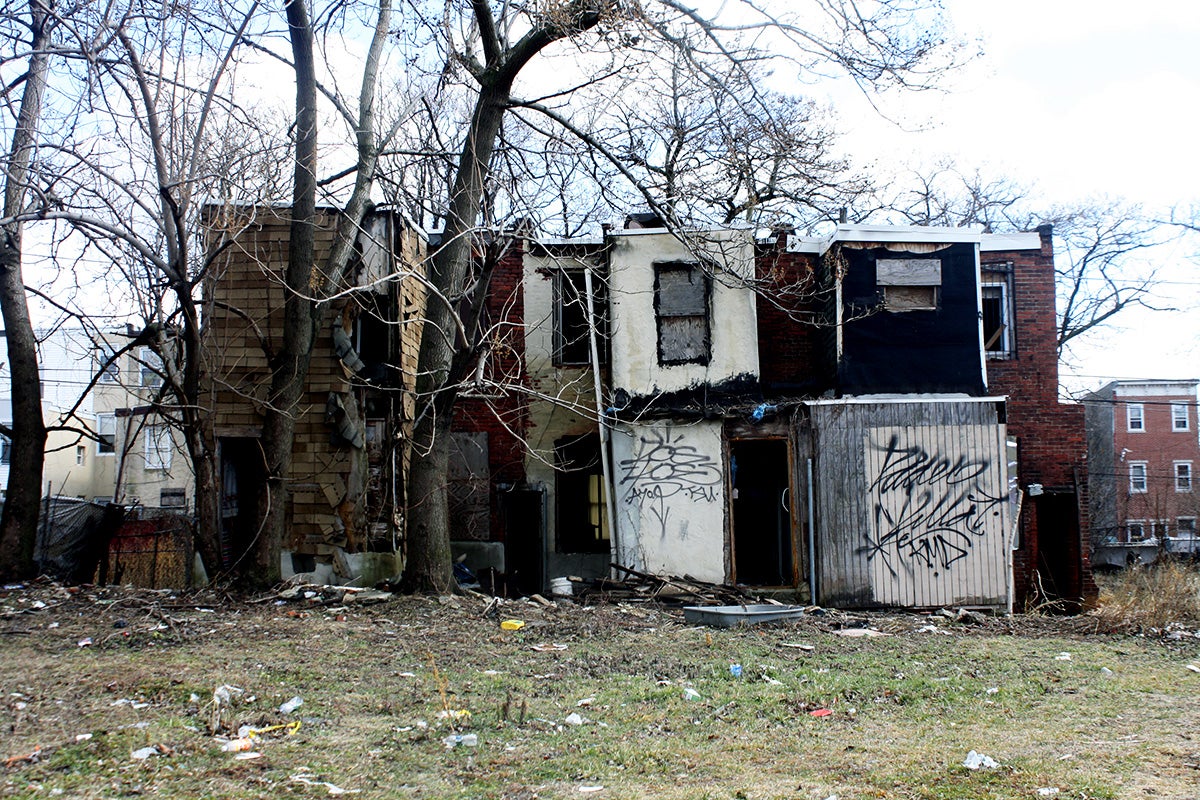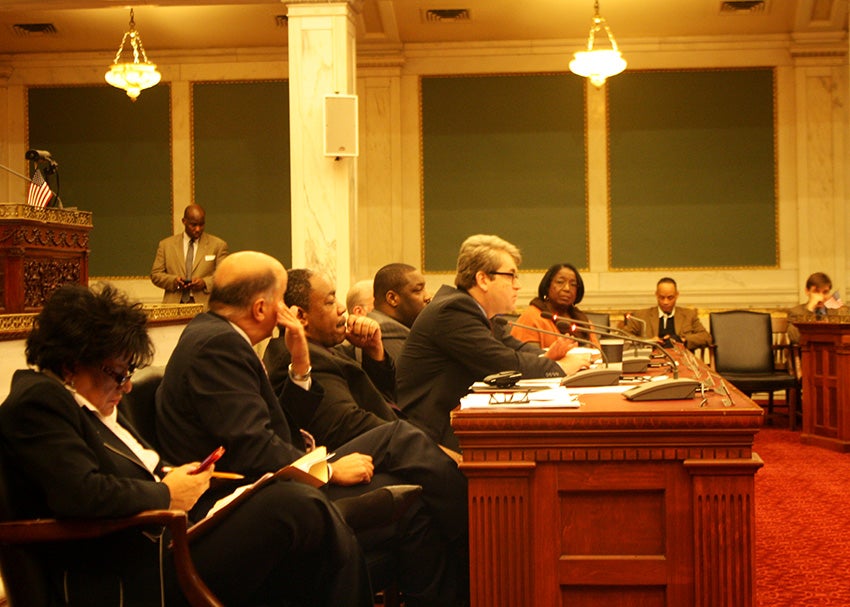Council Committee recommends tax foreclosure overhaul

City Council’s Committee on Finance gave a favorable recommendation Friday morning to a bill that would force a major shift in the way the city collects delinquent property taxes. The bill was introduced early last year by Councilman Bill Green and subject to close negotiations over the last six months between members of Green’s and María Quiñones-Sánchez’ offices, the Nutter Administration, Community Legal Services, and others. It was updated with a host of amendments at Friday’s Committee hearing.
In broad strokes and fine detail, the bill sets a strict timeline for foreclosing on tax-delinquent properties while implementing a clear process for bringing struggling homeowners into income-based repayment agreements with the city.
Before the hearing began, Councilwoman Sánchez, who co-sponsored the legislation, read a statement supporting it.
“By creating a single system of payment agreements … we will be more successful in getting taxpayers into compliance,” Sánchez said. “We will also make sure everyone knows the consequences of nonpayment.”
If the bill passes, the city will be required to notify tax delinquents within 60 days after the due date (March 31st) of current year taxes that they are at risk of foreclosure. That notice would contain the total amount of current property tax owed, the amount of back taxes owed, information about other city debt owed, information on assistance programs and housing counseling services and, most importantly, clear notification about available payment plans and the process for entering into them.
The city would be required to send a second notice if the taxpayer does not respond within 90 days. If the taxpayer does not enter into a payment agreement after one year, the city would be required to begin foreclosure proceedings.
The bill breaks the city’s taxpayers into four tiers. The first tier consists of individuals whose income is 70 percent or greater of the Area Median Income (AMI) which, statewide, is defined by the federal Dept. of Housing and Urban Development as $81,500 a year for the Philadelphia-Camden-Wilmington area. The second tier is those making 50-70 percent of AMI, the third tier is those making 30-50 percent of AMI, and the last is those earning less than 30 percent of AMI, $24,450 a year at most for a four-person household.
The payment plans available would differ for each tier. The Department of Revenue would have the discretion to enter into payment plans with Tier 1 taxpayers. Tier 2 taxpayers would be required to pay 10 percent of their monthly income toward the delinquent tax, Tier 3 would pay 8 percent of their income, and Tier 4 would pay 5 percent, or at least $25 per month.
The repayment incentives would also differ. Under the terms of the bill, 100 percent of fees and penalties would be forgiven for Tier 4 taxpayers who pay off the full principal delinquent amount. Fifty percent of interest and 100 percent of penalties would be forgiven for Tier 3, and 100 percent of penalties would be forgiven for Tier 2.
All taxpayers in payment agreements would be required to keep up on their current tax bills. If any taxpayer “breaches” the payment agreement three times, the agreement would be nullified, and foreclosure proceedings would begin.
An attorney for Community Legal Services and one of his clients both testified in support of the bill at Friday’s hearing, as did a member of the Philadelphia Unemployment Project.
Montgomery Wilson, the CLS attorney, said that one of the most important aspects of the bill is that it would make the payment agreement process uniform.
“One of the major problems with the current, essentially informal system,” Wilson said, “is that different payment plans are offered to taxpayers with different terms, depending on who they are dealing with.”
Revenue Commissioner Keith Richardson and Frances Beckley, an attorney for the Revenue Dept., testified that the Department supports the intentions of the bill but has some concerns about its level of detail and the lack of flexibility it gives the administration for enforcing the new system.
“It’s the level of specificity,” said Beckley after the hearing. “Most of the objectives—as [Green] mentioned, we’ve been working for six months, and I think we’ve all given a fair amount and we’ve come very close to meeting middle ground on almost everything. The question is, at what level do you want to prescribe what’s done, or do you want to give us flexibility as we have more experience and know better what works and what doesn’t work to readjust.”
Beckley said the Revenue Department supports the bill’s encouragement of payment plans for homeowner-occupants, but that there are some cases when such an agreement would be more than the taxpayer deserved, such as homeowners who rack up L&I violations and show no intention of resolving them.
“Just because someone is an owner-occupant doesn’t mean they’re a good neighbor …” Beckley said. “Why should the city subsidize somebody who we find is a bad owner? You can have that situation with an owner occupant, and City Council members know that, and so taking that discretion away from us is a little bit too bad.”
Green said he will listen to the Department’s suggestions for specific changes and what regulations they’d like to promulgate on their own, but that the level of detail in the bill is sort of the point.
“I think the important thing about the prescriptiveness of the bill [is] that this bill is prescriptive once, for one payment agreement,” Green said. “And if you don’t meet it, the Department has discretion entirely. Also, it is only prescriptive for people 70 percent of [Area Median Income] or less, so the Department maintains its discretion. So I want to work with them and see what regulations they would propose to put in place as opposed to the prescriptive nature of the bill, but a lot of time and effort and thought went into what [delinquency notifications] should be sent out in our working groups which I don’t think the Dept. of Revenue disagreed with. I guess I’m open to hear what they have to say but my inclination is to start this process and see what if any problems arise as a result of the prescriptive nature of our proposals.”
Green said the most important point about the bill is that creates a “carrot and a stick,” both an incentive for repayment and a certainty of enforcement. He said that it would allow homeowners to stay in their homes under affordable repayment plans that would also provide much needed revenue for the city. He predicts that the bill will actually lead to a decrease in the number of foreclosures in the immediate term after it is implemented.
“I’m really excited about it,” Green said. “María and I have spent four years working on this … eight months working with the administration and the legal services community and other stakeholders, and, I don’t know, it’s really good work by our staff. I’m very proud of it.”
Contact the reporter at jbrey@planphilly.com and follow him on Twitter @jaredbrey

WHYY is your source for fact-based, in-depth journalism and information. As a nonprofit organization, we rely on financial support from readers like you. Please give today.





